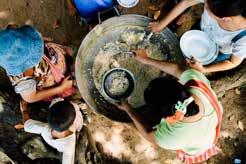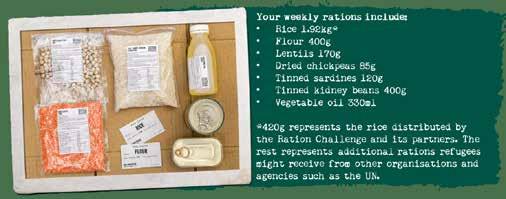
5 minute read
Eating Like a Refugee
Over the years my youngest daughter (now aged 20), has supported me in a number of activities designed to raise money and awareness for a range of charities.
After the last one she asked me to return the favour by doing the Ration Challenge (go. rationchallenge.org.uk/20-01/) with her. Whilst nobody in their right mind would call me a foodie, I do enjoy my food, so it was with great reluctance I agreed. It would not be overstating the case to say I was dreading the week; it felt like a big dark cloud on the horizon. As I write this I have one more meal to go, and the experience has been every bit as bad as I thought it would be!
Advertisement
At the start of the week my main fear was being hungry, but I hadn’t realised just how much rice 1.92kg is; the meals were boring and tasteless, but my stomach remained full. However, eating a diet that largely consists of refined carbohydrates and vegetable oil offers little nutritional value and so as the week went on I have felt increasingly tired and unwell. Today I am cold, even though the thermostat says the temperature in the room I am seated in is 20°C. I am nauseous to the extent I don’t want to eat, despite knowing that I will feel better for the food even if it is unappetising.
Food, although crucial for survival, is only one element of the refugee experience. These are people who have been forced out of their homes, their jobs, and have lost family and friends. Through no fault of their own, their entire social world has been destroyed.
As I cooked yet more rice, I wondered how it must feel to go from being a productive member of society with a home, a family, friends, a job and meaning in life to being part of a ‘problem’ in need of a solution.
No one is offered a choice about where they were born, nor does being born in a wealthy and politically stable country indicate some sort of superiority or worthiness in comparison to those born in countries ravaged by war or famine. To be born British is quite simply a massive gift that most of us never realise we have received.
Reflecting on this gift of security and stability during this week has troubled me greatly. It is not something I have given a great deal of thought to previously; but I am resident in a country that is home to less than one percent of the worlds displaced people and which seeks to tighten its borders still further. In response to the increase in numbers of people attempting to cross the channel this summer, Priti Patel stated she wants to make this route ‘unviable.’ Unviable? Getting into a crowded inflatable boat to travel 20.7 miles in one of the busiest shipping lanes in the world is viable?
Where does this leave me as a Christian?
This question applies both personally and professionally; as a youth minister, my choices, actions and opinions will carry weight with the young people I work with. There is no simple answer. On the one hand the Bible appears to be unequivocal, that we should welcome the stranger. The Israelites found themselves strangers in foreign lands; perhaps in response to this Deuteronomy includes specific provision

for treating strangers with care and maintaining their dignity. Jeremiah 7.6 is very clear, “do not oppress the sojourner” and Mt 25. 31-40 casts Jesus in the role of every stranger in need.
Throughout history these injunctions have coexisted with behaviours such as pogroms against the Jews, slavery, crusades, imperialism and colonialism, all of which seem to have a biblical mandate, but which demonstrate a very different approach to the stranger. Many Christians today see the issue as one of legality. There is no lawful route to enter Britain in search of asylum, so refugees are law breakers and should be returned. Others see it as more of a utilitarian issue, if we continue to accept refugees can we support our existing population? Still others argue it is a matter of reparation; the actions of the UK have led to the displacement of people, through warfare, climate change or trade and so we owe people safe haven.

Applying biblical principles to contemporary political situations and policies is not straightforward and Christians will find themselves on both sides of the debate. You may disagree, but for me a refugee is above all else a child of God, and so the Bible is clear and unambiguous. “Owe no one anything, except to love one another; for the one who loves another has fulfilled the law.” Rom.13.8






































